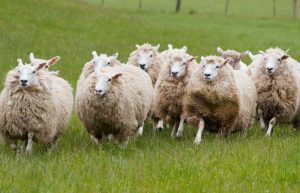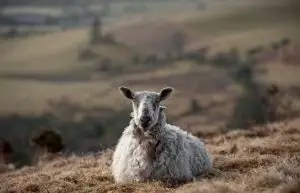
All The Ways Sheep Protect Themselves
Sheep are small livestock animals that can fall prey to many different types of predators. If you plan on getting sheep, you may be wondering just how susceptible sheep are to predators and whether or not they have any way of defending themselves.
So, how do sheep protect themselves? While sheep aren’t considered aggressive animals who would stand up against an attacking predator, there are things that they do to protect themselves:
- sheep will flee and scatter at any sign of danger
- a flock will gather closely together since predators are less likely to attack a group
- sheep have good senses that can notice when predators are near
- rams and dominant ewes may charge, head-butt, and trample predators
- wild sheep live on sheer cliffs and tough terrain to difficult for predators to maneuver
While sheep may seem like they do little to protect themselves from predators, there are many ways you can ensure the safety of your sheep. In this article, I’ll share more about sheep behavior and basic precautions you can take to keep your sheep safe. Keep reading!
Sheep Protect Themselves By Running Away From Predators
As prey animals, a sheep’s first and foremost thought is to flee from anything that could be a threat. Sheep can run fast for small livestock; they have been measured to charge as fast as 20 mph (32 kph), so if they’re in a dead sprint, they can probably run much faster.
Since sheep are prey animals, adrenaline kicks in when they feel threatened and have to run away from something; on the other hand, predators get an adrenaline rush when something is running and they need to chase it. Fleeing will be the most common response you see from your sheep when it comes to them facing something threatening.
Sheep Protect Themselves By Staying in a Flock
Another characteristic of prey animals is that they most often live in a community setting with the same species. The reason for this is that in a group there are many more eyes and ears looking and listening for danger compared to if it were just one singular animal.
Another reason for sheep to stay in a flock is that a predator is less likely to attack a group of animals compared to one off by itself. Usually, when predators prey on a sheep flock, they’ll go after the sheep that has wandered away from the flock. If the predator does try to attack the flock, the sheep will scatter in all directions, which can actually be used to confuse the predator. After they’ve scattered, the sheep will regroup in a tighter formation to ward of the predator.
If a sheep is isolated or doesn’t have a flock, it feels more susceptible to predators. This can lead the sheep to develop anxiety and depression. For this reason, it’s not a good idea to keep a sheep by itself. To learn more, check out my article Can You Keep a Sheep By Itself? Essential Guide.
Sheep Protect Themselves By Using Their Senses to Notice Danger
 Sheep have very good senses that enables them to recognize danger before it’s too late. Sheep have great eyesight through monocular vision, which is when the eyes are positioned on the side of the head. This allows them to see almost 360° around themselves at all times. Most prey animals have monocular vision while predators have binocular vision, where their eyes are on the front of their head and they can only see what is in front of them.
Sheep have very good senses that enables them to recognize danger before it’s too late. Sheep have great eyesight through monocular vision, which is when the eyes are positioned on the side of the head. This allows them to see almost 360° around themselves at all times. Most prey animals have monocular vision while predators have binocular vision, where their eyes are on the front of their head and they can only see what is in front of them.
Sheep also have excellent hearing. Their ears can swivel in all directions, enabling them to catch the faintest sounds off in the distance. Another sense they rely on is smell. Sheep are able to recognize an unfamiliar smell and be wary of it until they can inspect further. When they smell a predator, they can instantly be on alert.
Rams and Dominant Ewes Are More Likely to Stand Up Against Predators
While rarely will domesticated sheep stand up to a predator, it does happen on occasion. While an aggressive sheep may not be enough to stop the attack of a predator, it can thwart off the predator long enough for the flock to re-gather. Out of your flock, the most likely to defend against a predator would be a ram. A ram is an intact male sheep that is often bigger, stronger, and more aggressive than other sheep.
Another sheep that would be more likely to stand up against a predator would be a ewe trying to protect her lambs. Unfortunately, lambs are often the victims of most predators since they are smaller and slower than the other sheep. Once in a while, you may get a brave mama who doesn’t want her babies messed with.
When these sheep attack, they will often charge, headbutt, and even try to trample. If a sheep is uncomfortable with humans, they may also display this behavior towards you. Always be mindful of your sheep’s behavior and how you’re coming across to them.
Wild Sheep Live on Cliffs to Deter Predators From Catching Them
Sheep are known to have been domesticated around the same time as dogs, so they’ve had plenty of time to get used to the comfy lifestyle where they are less willing to out-smart and out-think predators. Wild sheep on the other hand, are the opposite!
Wild sheep tend to live on sheer cliffs and high up in the mountains where predators wouldn’t dear to go. They are able to balance and jump from rock to rock to escape danger, seeking the higher ground where the predator can’t reach them. Wild sheep breeds often have magnificent big horns that can be used for defense and thwarting off other animals. Wild sheep are a sight to behold!
Things You Can Do to Protect Your Sheep:
While sheep often rely on their prey animal instincts to evade predators, there are things you can do to further protect your sheep from predators. Putting up secure fencing, corralling your sheep at night, and getting a livestock guardian animal are just a few easy ways you can provide your sheep with better protection. To learn more, keep reading!
Put Up Fencing That Deters Predators From Reaching Your Sheep
Good fencing can keep most predators out of your sheep field. One of the best types of fencing to use around a sheep pasture is woven or welded wire fencing; this is wire fencing that has been woven or welded together to create a lattice barrier that will keep animals from crawling through.
Sheep fencing should be at least 4′ in height to deter predators from climbing over. A sheep’s biggest predator in the United States is a dog, whether domesticated or undomesticated. Often times, a dog, coyote, or fox cannot climb a 4-ft fence. You should also bury your fence at least 1 ft into the ground to deter predators who may try to dig their way under. Another plus for a strong and secure fence is that it should also keep you sheep from escaping!
Put Your Sheep in a Corral or a Run at Night
Most predators are nocturnal and hunt at night. During the darkness of nighttime, vision is more limited and predators can hide themselves easy as they sneak up on their prey. In most areas where predators are a real threat to sheep, many farmers will corral their sheep for the night.
A corral will keep your flock together in a more secure place compared to out in a large pasture. It can also give you time to provide your sheep with extra feed and supplements while also looking them over for any sign of sickness or injury. Prey animals are naturally more on-edge during the night hours, so placing your sheep in a corral can help give them more peace of mind.
Invest in a Livestock Guardian Animal
One effective way to protect your sheep against predators is by investing in a livestock guardian animals. These are specific animals known to be loyal to a flock and willing to fight and chase off predators. Popular guardian animals for sheep include dogs, donkeys, and llamas.
Dog breeds like Great Pyrenees, Anatolian Shepards, and Mastiffs are often used as livestock guardians due to their big size, loyal personality, and protective instinct. As a predator animal itself, a dog will likely fight off any danger that comes for your sheep.
While prey animals, donkeys and llamas have a stubborn and an aggressive streak in them that comes out when a predator creates a ruckus. Donkeys and llamas don’t like chaos, so they’re often triggered to attack when a predator is causing sheep to get all worked up. If you want to know more about livestock guardian animals, check out my article What Are the Best Livestock Guardian Animals?
Want to know more about sheep? I have an entire article dedicated to describing sheep behavior and characteristics. To read more, visit my article Sheep Behavior: Ultimate Sheep Behavior Guide.
